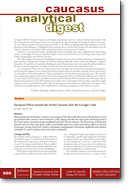Georgia's Identity-Driven Foreign Policy and the Struggle for Its European Destiny

Author(s): Kornely Kakachia
Editor(s): Iris Kempe, Matthias Neumann, Robert Orttung, Jeronim Perovic, Lili Di Puppo, Hans Gutbrod
Series: Caucasus Analytical Digest (CAD)
Issue: 37
Pages: 4-7
Publisher(s): Center for Security Studies (CSS), ETH Zurich; Research Centre for East European Studies, University of Bremen; Institute for European, Russian and Eurasian Studies, George Washington University
Publication Year: 2012
